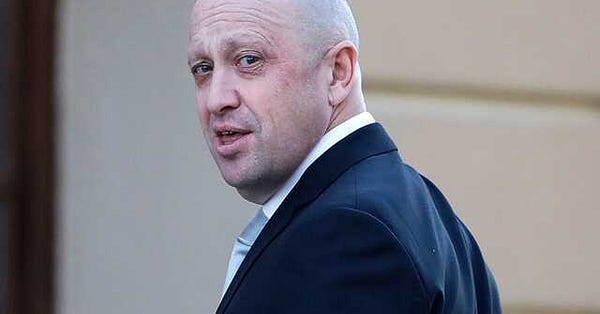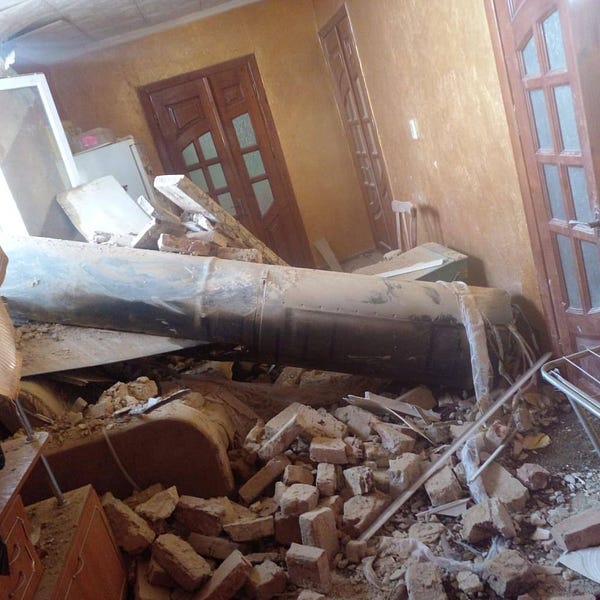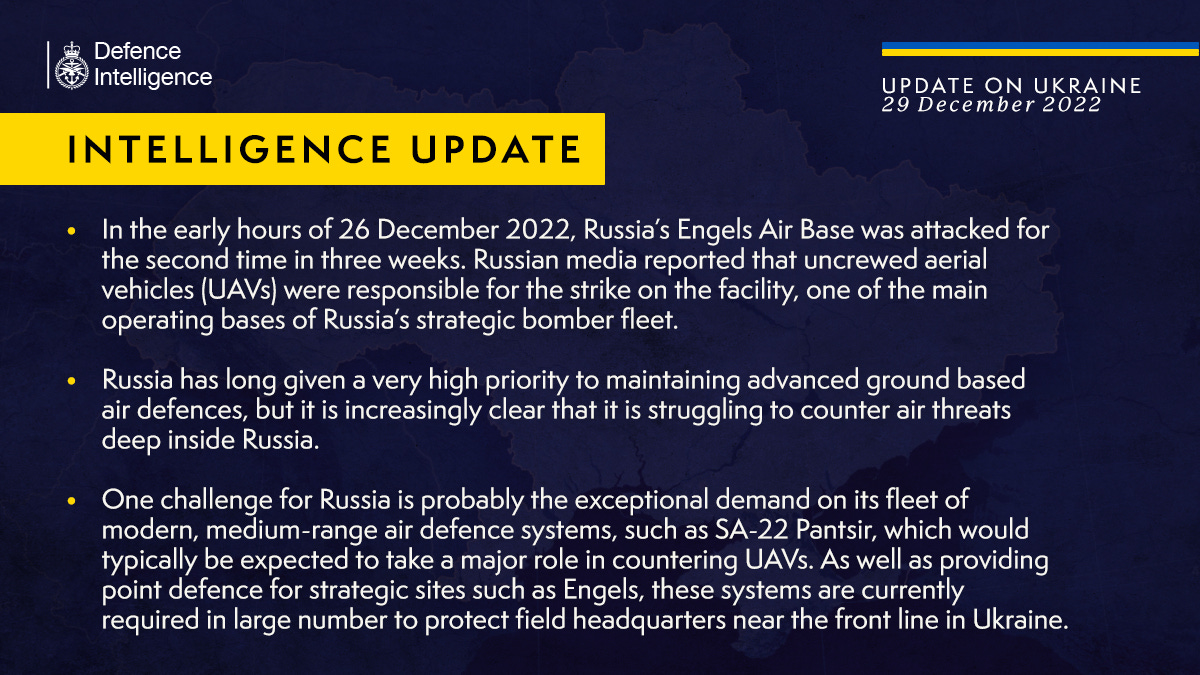Dec 29 Buonasera Mag
Day 309: RUattacks Poltava IronOre StPete's RULaw RUmedicine Kathy insurance EUschool RUGas UK bots Kosovo-A&Ps-Lautman UADef ISW UKDef Tendar Leiderman spies RadPod Ryan Rosenberg Babij Tymoshenko
Catching up…
EA Worldview’s Ukraine Up-date- hop over to Scott’s amazing hourly Ukraine up-date page. I’ll fill in with some bits and bobs.


Stories we’re following…
There were early morning air raid sirens in Kyiv and Kherson today. At 11:00 am, the Kyiv city authorities announced the all clear, but cautioned residents to “keep an eye on reports and return to shelter if the siren sounds again.”
There were widespread reports of power outages as residents in cities across Ukraine were warned to stay in air raid shelters, charge their devices and stock up on water where possible. The city of Lviv was reported to be 90% without electricity as a result of the attacks. Maksym Kozytskyi, Lviv’s governor, said “air defence forces destroyed 70% of the missiles flying over Lviv region. Energy companies have already started repair work and should restore power supply in the regional centre by the end of the day.”

The Ukrainian MP Lesia Vasylenko has accused Russia of targeting civilian medical facilities as a deliberate strategy, following a strike on a historic medical centre in Kherson this morning. Posting a picture of the damaged facade of the building, she wrote:
Cardiology department in Kherson hit. Russia army targets medical institutions in the region. Targeting the most vulnerable civilian groups is a strategy of Moscow.
Kyiv’s mayor, Vitali Klitschko, has provided an update on the power situation in the city on Telegram, saying that 40% of the residents are without electricity.


Zelensky to parliament: ‘Ukraine is on track to victory that all generations have dreamed of.’ On Dec. 28, President Volodymyr Zelensky delivered his annual speech to the Ukrainian parliament, the Verkhovna Rada, during its last session this year.
ISW: Russian forces appear less likely to conduct new offensive in Zaporizhzhia Oblast. The U.S.-based think tank said in its latest report quoting a senior Ukrainian military official that there are "no signs of Russian forces in Zaporizhzhia Oblast forming strike groups" despite some rotations and deployments there.
Ukrainian military: Russia deploys additional ships to Black Sea. Ukraine's Southern Operational Command reported early on Dec. 29 that Russia has deployed two surface and submarine missile carriers on combat duty in the Black Sea. The carriers are equipped with at least 20 Kalibr missiles.
The court seized 166,000 tonnes of iron ore, stored in Ukrainian seaports, belonging to a foreign company, worth an estimated UAH 1.8 billion. This was reported by the Prosecutor General's Office, according to Ukrinform. The SBU investigation found that in 2021-2022, a non-resident entity registered in the European Union member state, together with Russian companies affiliated with Alisher Usmanov, declared the transfer of iron ore for a total amount of more than UAH 1.3 billion. The Russians tried to illegally transport the concealed iron ore by sea to the territory of Russia. After that, the minerals were set to be transferred for the needs of Russia’s metallurgical industry and the military-industrial complex.

Putin has signed a federal law making activities classified as “sabotage” punishable by up to life in prison. Other crimes include:
“Aiding sabotage” is now punishable by either a prison sentence of 10–20 years or a life sentence.
“Training for the purposes of sabotage” or “organizing” sabotage is punishable by 15–20 years in prison or a life sentence.
“Participating in a sabotage group” is punishable by 5–10 years in prison.
The Insider: The war and the subsequent sanctions dealt a heavy blow to Russian medicine as well: clinics faced an acute shortage of many drugs, especially expensive ones and those needed to treat serious illnesses; the best doctors left the country, while others were sent to the frontline areas and occupied territories. (pls read the full article)


Odesa begins dismantling monument to Russian empress. Local media reported that the dismantling of the monument to Russian Empress Catherine II started on the morning of Dec. 28.
Reuters reports that ship insurers have said they are cancelling war risk cover across Russia, Ukraine and Belarus, following an exit from the region by reinsurers in the face of steep losses. The moves by the insurers will make it harder for ship-owners or charterers to find insurance, increase prices and may mean some ships sail uninsured, industry sources say.
New York Times: US tries to stop Iran from providing drones for Russia. Several intelligence, military and national security officials have told the New York Times about an expanding U.S. program that aims to cut off Iran’s ability to manufacture combat drones and make it harder for the Russians to launch the unmanned “kamikaze” aircraft.


The European Commission says it is donating €14m to buy and transport school buses for Ukraine, as well as an additional 120 buses “to bring Ukrainian children safely to school”.
The volume of Russian gas exports to countries far abroad has reached the lowest values in the last more than 20 years, — Bloomberg. In this way, the export of Russian gas "to key foreign markets" decreased by 46% compared to the figures for 2021.
UK to provide Ukraine with Sea King helicopters. The U.K. will supply Ukraine with Sea King helicopters as part of its continued support for Kyiv amid Russia’s invasion of Ukraine, the U.K. Defense Ministry announced on Dec. 28.

Italy is keeping a close watch on the Kremlin’s assets in the Mediterranean, remarked the Commander of the Naval Squadron, highlighting Italy’s synergistic operations within the Alliance and crucial role in securing the region’s waters.
AFP: The roadblock near the main border crossing between Kosovo and Serbia was removed Thursday, state-run TV said, announcing a move that paves the way to easing of tensions in the volatile region.

How Citizen Spies Foiled Putin’s Grand Plan for One Ukrainian City- NYT
Kherson, at the mouth of the Dnipro, near the Black Sea, was captured in the war’s first days. Russian officials soon declared it part of Russia forever.
Kherson’s occupation government, run by Russian military commanders and Ukrainian collaborators, wasted little time pulling down Ukrainian flags, taking over Ukrainian schools, trucking in crates of Russian rubles, even importing Russian families. Perhaps nowhere else in Ukraine did Russia’s leader, Vladimir V. Putin, devote so much money and violence, the carrot and the stick, to bend a city to his imperial will.
But it did not work.
Guided by contacts in the Ukrainian security services, an assembly of ordinary citizens formed themselves into a grass-roots resistance movement. In dozens of interviews, residents and Ukrainian officials described how retirees like Mr. Yermolenko — along with students, mechanics, grandmothers, and even a wealthy couple who were fixing up their yacht and got trapped in the city for the better part of a year — became spirited partisans for the Kherson underground. It was like something out of a spy movie.
Mick Ryan, Russia’s New Theory of Victory- Foreign Affairs
Christmas Day will be a grim milestone for the Ukrainian people. It will mark almost exactly ten months since Russian forces crossed into their country, bringing devastation on a scale not seen in Europe since World War II. Tens of thousands of Ukrainians have been killed. Millions have fled their homes. Most of the state has lost power, leading Kyiv to worry that—as winter sets in—many of its citizens will freeze.
But Christmas will also be a grim marker for Russia. Moscow planned for a short, victorious campaign. Ukraine has instead dealt it a bitter lesson on modern…

Larissa Babij, a Kind of Refugee- December 23, 2022
Outside the day is sunny and mild. My trusty cafe on the right bank is without power. The air raid alarm in the city is the least of my concerns. For an hour I am a dejected nomad: hungry, directionless and disconnected.
Then suddenly I am a “normal” person, sitting at my laptop in a hipster cafe, energized by rock music plus a flat white and sumptuous croque madam (pricy by Ukrainian standards is still less than $10 USD). The coffee shop (with power strips and extenders in every outlet) is packed with young, fashionable people, their dogs and devices.
In the 1930s Soviet Ukrainian intellectuals lived well in Kharkiv while the peasants in the surrounding villages were being starved to death. Today in Kyiv you can wake up in an apartment with no heat, electricity or running water and spend the afternoon catching up on email while sipping aromatic coffee. Only the latter is getting more difficult by the day.






